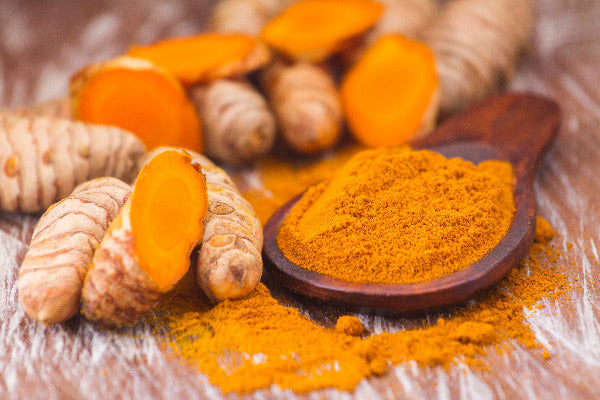Turmeric Health Benefits & Turmeric Essential Oil Benefits
Turmeric is a popular culinary spice with an earthy flavor and aroma. While it’s used to add color and flavor to many Asian and Middle Eastern dishes, turmeric also has medicinal properties, giving turmeric health benefits that many are unaware exist. This vibrant orange root has been used for centuries to help with many health issues, from pain to inflammation. Today, research is helping support the claims of turmeric essential oil benefits.
9 Turmeric Health Benefits

1. Powerful Anti-Inflammatory
Turmeric has many benefits, but its anti-inflammatory properties are probably the most well-known.
Inflammation is a necessary process. The body uses it to fight off illness and repair injuries. However, chronic inflammation over the long-term can lead to disease and other health issues. Getting inflammation under control is important.
Curcumin, the main compound found in turmeric, acts as a powerful anti-inflammatory. It’s so powerful that it’s just as effective as anti-inflammatory drugs – without the side effects.
How does turmeric work its magic on inflammation? By blocking NF-kB, a molecule that triggers the inflammatory response. Researchers believe that this molecule plays a role in chronic diseases.
2. May Help with Arthritis
The anti-inflammatory effects of turmeric may help with arthritis. Joint pain and stiffness are often the results of inflammation.
Studies have shown that taking one gram of curcumin a day can help with arthritis. The Arthritis Foundation recommends taking 400-600 mg turmeric capsules three times per day.
In one randomized trial,139 patients with knee pain were given either 500mg of curcumin three times a day or 50mg of diclofenac pills twice a day. Both groups experienced significant pain relief, which makes curcumin a great alternative to conventional medication for arthritis pain relief.
In another study, 70 participants with knee osteoarthritis were given either 1000 mg of turmeric per day or a placebo for 12 weeks. The study found that turmeric was more effective than the placebo at reducing knee pain.
3. Potent Antioxidant
Another potential driving factor behind aging and disease is oxidative damage caused by free radicals. Free radicals react with DNA, fatty acids, proteins, and other organic substances to cause damage.
Antioxidants can help neutralize free radicals, and curcumin is a potent antioxidant. The curcumin in turmeric can also stimulate the body’s antioxidant defenses.
4. Can Enhance Brain Function
The curcumin found in turmeric may also be a powerful brain booster. It can help reduce the risk of brain diseases and improve brain function while boosting neurotrophic factor.
Neurons can form new connections, but they can also multiply in certain areas of the brain. One way to initiate this process is through brain-derived neurotrophic factor, or BDNF. BDNF is a growth hormone that affects the brain. Curcumin has been shown to increase BDNF levels in the brain. Higher levels of BDNF may help reverse brain disease or prevent age-related cognitive decline.
It’s believed that curcumin’s BDNF-boosting effects may also improve memory function.
Another study researched the effects of Turmeric oil on neural stem cells. Turmeric potentially inhibits microglia activation which has potential use in treating neurodegenerative disease. After injecting rats they found that both groups had a rapid increase in the growth of neural stem cells.
5. May Promote Heart Health

Heart disease is the leading cause of death in the world. It’s a complicated disease with no single cause. However, there is some evidence that curcumin may help reverse part of the heart disease process.
It is still unknown why this compound can help with heart disease, but it is believed to help improve the function of the endothelium or the lining of your blood vessels. One study found that the curcumin in turmeric can be just as effective as exercise at improving this function.
Turmeric’s anti-inflammatory and antioxidant properties may also help with heart disease. Oxidative damage and inflammation are both believed to play a role in the development of heart disease.
In one study, 121 people who were undergoing bypass surgery were given either a placebo or 4 grams of curcumin per day for a few days before and after the procedure. The group that took curcumin experienced a 65% reduced risk of a heart attack while in the hospital.
6. May Have Anti-Cancer Properties
Cancer, like heart disease, has many causes. While there are many types of cancer, many of them have several things in common. Some are affected by curcumin.
One study found that curcumin along with turmerone, an aromatic compound in turmeric essential oil, can help fight colon cancer in animals. The potential anti-cancer effect of turmerone is one of the top turmeric essential oil benefits.
Research shows that curcumin can affect cancer development, growth, and spread on a molecular level.
Other studies have found that curcumin may contribute to the death of cancerous cells. There is also evidence that the curcumin in turmeric can reduce cancer cell growth.
A small study was conducted on mice testing the components of turmeric essential oil. They discovered that a low dose of Turmeric helped suppress adenoma multiplication by 73% and that both low and high doses of Curcumin helped decrease adenocarcinoma multiplication by up to 69%. A combination of both Tumeric and Curcumin stopped tumor formation.
In a small study, 44 men with lesions in the colon that may turn cancerous took 4 grams of curcumin per day. The treatment helped reduce the number of lesions by 40%.
Some research suggests that turmeric can help prevent cancer in the first place.
7. May Fight Depression
Major depression impacts over 7% of people in the United States alone. This figure doesn’t include minor bouts of depression. Curcumin has shown a lot of promise in being able to reduce depression.
The substance was the focus on a 60-person study that divided participants into three main groups:
- Prozac
- Curcumin
- Prozac and curcumin
Over a six-week period, the participants given turmeric received 1g of curcumin daily over a period of six weeks. Interestingly, the study found that people taking just turmeric or Prozac had very similar levels of depression decline.
Turmeric was able to reduce depression at a level that is on par with the go-to method of treating depression: Prozac.
The group that took both noticed the greatest decline in depression symptoms.
Researchers assert that BDNF levels in the body are increased when a person consumes curcumin. Since depression is linked to a reduction in BDNF, consuming this substance allows the brain to rebalance and reduces depression.
Additional studies suggest that dopamine and serotonin levels are improved when curcumin is consumed, if you have depression, adding turmeric into your diet has the potential to stop depression at a level that is similar to Prozac – what many doctors recommend for depression.
8. May Help with Acid Reflux

Turmeric is often used as an alternative treatment for inflammation, heartburn, and stomach ulcers. There is some indication that turmeric may help with acid reflux and gastroesophageal reflux (GERD).
GERD and acid reflux are believed to be caused by oxidative stress and inflammation. Treatment with anti-inflammatories and antioxidants may help.
One study in 2011 found that curcumin’s anti-inflammatory effects helped prevent esophageal inflammation. Other recent research has found that the anti-inflammatory and antioxidant properties of curcumin can help treat digestive issues.
9. May Help with IBS
Doctors still can’t pinpoint what causes a person to suffer from IBS. While there’s no cure for the condition, there is some hope: turmeric. As an anti-inflammatory that is also known for helping relieve digestive problems, turmeric taken over a period of eight weeks was able to reduce abdominal pain, discomfort, and improve a person's bowel movement patterns.
It's important to note that additional studies on turmeric and its ability to help relieve IBS symptoms are required. The pilot study, linked previously, did show positive results in participants suffering from IBS.
One last thing to note is that turmeric is difficult for the body to absorb by itself. If you're using the spice instead of essential oils, mixing turmeric with black pepper and olive oil can help improve absorption. The piperine in pepper is what helps boost absorption.
